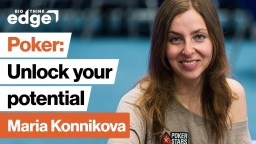Maria Konnikova learned how to play poker for the simple purpose of researching her book, The Biggest Bluff. Then she became an accidental poker champion, winning over $300,000 in tournament earnings.
In this video, Konnikova examines the methods and techniques used by the fictional detective Sherlock Holmes, and how they can be used to improve one’s own ability to think critically.
Through the “scientific method of mind” we can master the art of deduction, optimize our mental resources, and think like a detective.
Maria Konnikova: It’s important to remember that Holmes wasn’t born Holmes. Holmes was born like you and me but probably with greater potential for certain elements of observation, but he learned over time to think like Sherlock Holmes. At the beginning, he probably thought more like Watson because that’s more of our natural state. He’s able to attain what he does because he’s become an expert of sorts at observing.
He’s become an expert at person perception. What I mean by this is he has thousands and thousands of hours of practice, and that practice has been interwoven with feedback. So I look at you and I tell you something about yourself. And you say, “No, that’s actually wrong. That has nothing to do with me at all.” Or you say, “Wow. How did you know that?” So I’m learning which details matter, which details don’t matter, which observations are logical, which ones are false. And over time I build up that expertise that will allow me to look at you and in one second say, “Hey, Watson, I think you’ve been in Afghanistan.” And it seems like it’s completely just out of the blue, oh, my God, how did he know that? But then if you go back, you’ll see that this is not intuition in the sense of just “I knew it.” It’s intuition in the sense of expertise, in the sense of judgment that has been honed over years and years of practice.
So, for Holmes, the entire thought process is akin to a scientist who is doing a research experiment, so someone who is doing - who is following the scientific method. So for him the mind is like an attic, and what that means is you can store only so much in it. The space is finite. And what you store and how you store it is incredibly important as you try to figure out, how do I optimize my mental resources? How do I then take the things I’ve stored and access them? How do I organize them so that there are connections between them so that I can use them and make them as part of kind of a broader whole so I can see the bigger picture and not just these random components that I put there?
So, what a researcher would do at the beginning of an experiment is to say, what is my question? And that’s exactly what Holmes does. He says, what is my goal? What do I want to accomplish? Before he ever opens a case, before he ever meets a client, he already wants to know what is it that I want to get from this meeting. And so he comes into the meeting with a prepared mindset. His attic has already been primed, so to speak, to take in certain inputs and to not allow other inputs in. This is important because attention is incredibly finite, and so we don’t have just endless resources, so we can’t pay attention to everything; we do need to be selective to what we pay attention to.
Now the scientist after kind of setting this hypothesis would say, okay, how would I go about testing it? That’s, once again, exactly what Sherlock Holmes does. After he sets his goals, he goes about observing and collecting data, and asking, okay, how do I answer this question? And what is it about this conversation, about this person, about this situation, whatever it happens to be, that will enable me to gather the data that I will then be able to use to see whether my hypothesis holds up?
And then he does this thing that every great scientist does and I think mediocre scientists probably do not, which is take a step back and learn to look at the data, recombine it, look at different possibilities, be imaginative with that data to see, is there anything that I didn’t think of beforehand? Is my mind still open? Do I still know what’s going on? Does this data somehow make me think of new ideas, think of new approaches, think of things that I hadn’t thought of in the past? And so he has this incredible space for imagination, and I think that that is an essential part of the scientific method as well. You know, scientists from Feynman to Einstein have really valued the importance of imagination and have spoken a lot about it. So the reason I’m stressing this is because people tend to forget it when they think about the scientific method.
Now finally, what you do after that is you go back to the data and you look at the - kind of what you’ve done with it and you see what makes sense based on my observations. Have I framed the question properly? Have I accomplished my goal or do I need to start over? Because it’s an iterative process. You may need to go through this method over and over and over until you finally come to a conclusion. And that's kind of the final step of Holmes’ approach. He always keeps his education going. He realizes that the scientific method doesn’t have an end. You’re always going to have to go back the beginning. It’s going to be a constant feedback loop.





